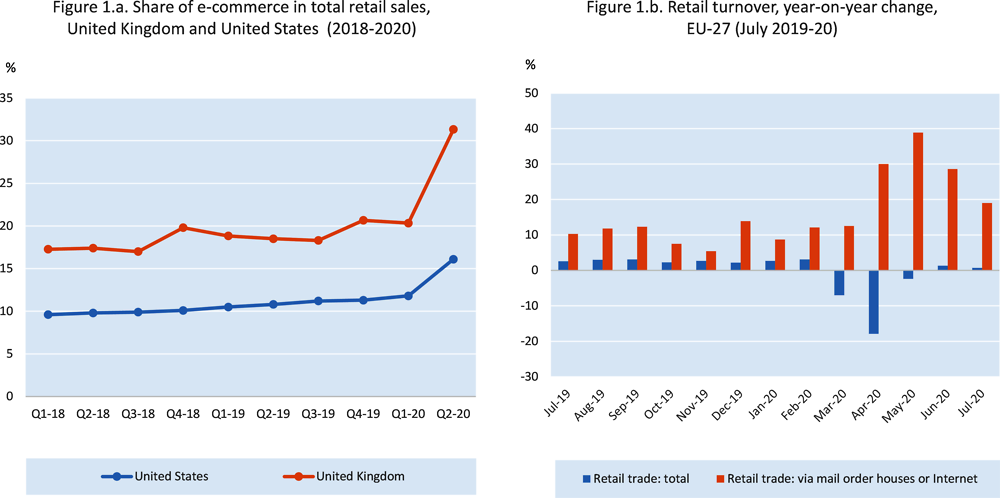The global pandemic of COVID-19, the new social dimension, and the continuous obligation to stay at home has boosted consumers to increase their interest in online shopping. This situation has consequently affected the demand and uncertain supply chain issues for the e-commerce industry. Indeed, as the World Trade Organization (WTO) declared, it has been the most important period of time for e-commerce to save the world economy intervening with vigor and vitality to prove the importance and effectiveness of e-commerce in the field of trade and online shopping.
As observed, due to the rapid spread of COVID-19, shares of traditional trade have become increasingly volatile and in marked decline, a reason for which a major part of traders of traditional markets have decided to move towards online trade in order to keep up with the rest of their share, sustaining their commercial dimension and thus their success in local, national and international markets.
Although e-commerce has been affected by the pandemic of COVID-19 globally, certain regions of the world such as America, Europe and Asia have witnessed the major changes most particularly. Generally speaking, the pandemic has led to many people from OECD countries having to limit physical interactions due to the imposition of strict confinement measures. As an example, in the case of the United Kingdom, the shares on e-commerce in retail rose from 17.3% to 20.3% during the first quarter of 2018 and the first quarter of 2020, to then rise considerably to 31.3% between the first and second quarter of 2020. For other areas such as the People’s Republic of China, the shares of total online retail accumulated retail sales between January and August 2020, reaching a total of 24.6%.
Figure 1. The COVID-19 crisis has increased the share of e-commerce in total retail
Source: OECD Data 2021
In respect to the dimension of multinational companies, we would be ready to state that e-commerce has gained extensive popularity over recent months. Certain companies such as Amazon or Alibaba have become leaders of their spaces, changing dramatically the current business climate, as for those stores that have closed their doors, for the time being, there have still come about new methods of generating income, especially when having a reliable e-commerce platform that can promote the creation of stable revenue and saving the business of thousands of companies.
Nonetheless, we must recognize that consumer behavior has been the most affected realm. A recent study by the OECD has reported a 40% increase in e-commerce since the beginning of the sanitary crisis. Indeed, aside from being an efficient way of generating revenue, we can still find other benefits to supply companies’ products online, reason that explains why it is so crucial for any business to have an online shopping platform.
In the following paragraphs we will be able to see some of the benefits that e-commerce can provide to any business company.
1 – Boosting convenience though e-commerce. Selling products through an online platform offers a convenient shopping experience for customers. Convenience can now be achieved easily, clicking a button and from the comfort of customers’ couch. Undoubtedly, with so many people having to stay at home, convenience and e-commerce have never played such a fundamental role.
2 – Increasing market size. Another benefit is that having an e-commerce platform will increase the potential market size of hundreds of companies with minimal effort, especially in the context of COVID-19 and the current business climate.
3 – Insights on consumer behavior. What is more, online shopping is highly trackable, which means that all businesses, particularly the smallest, can benefit from a better understanding of their consumers. Nonetheless, when it comes to understanding consumer behavior, companies should focus on:
a. Key factors that can help the segmentation of customers.
b. How customers interact with companies’ sites.
c. How customers reach or have reached the companies’ sites.
d. Preferences of customers and where they are visiting the most.
e. What devices customers are using to access companies’ sites (mobile phone, desktop…)
With COVID-19 having dramatically changed normal consumer behavior, it is an important time to understand and to adapt to the new preferences of customers, creating new marketing strategies in order to target customers more appropriately.
4 – Programs to impulse gaining insights. Many useful programs can help companies to gain insights for their e-commerce platforms. Some examples of these type of analytics tools include Microsoft’s Power BI & Dynamics365. Using these programs will help companies to stay informed and up-to-date on how consumers interact with websites.
5 – Lower variable expenses through e-commerce. As mentioned previously, with the current business environment, many businesses are no longer generating the same income as before, what means that necessary operating expenses become much harder to be paid. Unquestionably, using online platforms can help lower variable operating costs as well as helping companies to decrease in advertising expenses by focusing on their ad budgets and on more cost-effective options like pay-per-click or social media.
6 – Survive with E-commerce. The ongoing environment is making it more than challenging for companies to survive. Indeed, it has never been so critical for small business to be available online. Without any single doubt, utilising e-commerce can help your business to survive through these times full of uncertainty.
To conclude with and as has been detailed above, the global crisis of COVID-19 has accelerated the expansion of e-commerce towards new firms, customers, and different type of products. Although in the past for many consumer groups e-commerce was focused on high tech goods, toys or books, it now increasingly involves goods for which availability is critical to a larger share of the population, including groceries, medicine and other necessities. For most of the firms, e-commerce is now a vital alternative and a differentiated sales strategy which allows continued operations despite of contact restrictions and other confinement measures.
Nevertheless, it is absolutely true that in order to ensure an efficient e-commerce landscape that adapts to everyone, policy makers should further foster the enabling environment for online transactions in specific areas such as digital connectivity, logistics and international trade, included in all kinds of digital goods and services. Supporting the creation of innovative e-commerce business models, ensuring that regulatory frameworks remain flexible enough to shelter different combinations of online and offline business functions as well as reducing regulatory uncertainty and promoting transparency through information sharing have turned out to be vital in the fundamental role that e-commerce has played during the global crisis of Covid-19.
Source: Tekshapers Blog “Shaping Intelligence”
As experts have recently predicted, in terms of future of e-commerce in the 21st century, it will be confirmed as the major tool of sales for goods and services.
Are you aware of the fundamental role that e-commerce has played during the global crisis of Covid-19?







